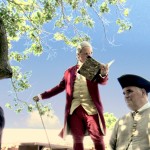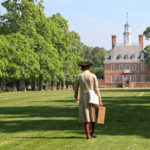We call them Sales Interpreters. Technically, our colleagues in Historic Area shops sell merchandise, but their role is anything but ordinary retail. You may find them demonstrating trap-ball on Duke of Gloucester Street, or answering a question about the city’s history, or having a little fun in character.
Such unconventional behavior is bound to make a person gruntled, that is, happy—anything but disgruntled.
We asked several colleagues to share a little bit of their experience working a sales floor in costume. Here, mostly in their own words, is what they had to say.
Michelle: “I didn’t think I would like being in costume.”
Michelle worked at The Craft House before being drafted into Historic Area duty several years ago. She was a little worried about how she’d take to that strange world, but she hasn’t looked back.
I didn’t think I would like being in costume because… I just didn’t think it was me. I thought you’d have to be more well-versed in Revolutionary American history. I’m not one who can spit out facts and dates like some of our interpreters, so the knowledge part was intimidating.
But my co-workers are great and I have learned so much just sitting and listening to people. I go home and tell people weird facts. I’m such a nerd now. But that’s the joy of it.
The guest experience is so unique because we can become different people if we want to. We can stay in the present or we can make a story, which we do a lot at the auctions. We rib each other a lot.
And I love the ever-changing environment. I’m not just stuck in one store. I can be here at Greenhow, I can be at Mary Dickinson’s selling dresses, I can be at the Colonial Nursery interpreting plants and their 18th-century uses, or out at the Market House playing trap-ball.
Because I’m a mom with a teenage daughter, my favorite item is the courting lamp. [Ed. Note: the courting lamp is only available in our auctions.] You fill it with oil, and depending on whether you like the gentleman who might be courting your daughter, you can fill it as high or as low as you want when he comes to visit. Once the fuel runs out, it’s time for him to go home.
It’s amazing! I love it!
Joel: “Everybody has bits that they do.”
Joel, a graduate of William & Mary who has acted professionally, started with Colonial Williamsburg last fall when the Market House opened. He thought working as a sales interpreter would fill the space between gigs. Now, he does his best to work his gigs around work in the Historic Area.
There’s a mandate to maintain the historical environment and to help people understand how the products fit into it. Everything is so jam-packed with historical context. Everybody who visits here wants to hear stories and anecdotes. I’m selling a product, but I’m also putting it into a greater historical context.
Everybody has bits that they do. When a guest buys our handmade soap balls and bars, I’ll always tell them that we were having a soap revolution at the same time as the American Revolution because people realized that if you made soap out of vegetable oil rather than animal fat, then it actually smelled a lot better.
Working in costume helps it all come together. It locks you into the time period and the environment, and helps you focus.
Danielle: “I’ve gotten used to having my picture taken.”
In her full-time job, Danielle works with children with autism and Down Syndrome. She is very much the teacher, having also home-schooled her own children for several years.
I didn’t know they’d hire a normal person like me. One of the questions they asked me in my interview was, “Can you see yourself in colonial garb?” I said sure. And even though I hadn’t applied for a costumed job, that’s what I got.
It’s a little bit of work getting dressed. My hair actually comes down to here [Danielle puts her hand on her back below her waist]. I have to put my hair in a braid and then get it as tight as I can with bobby pins and everything.
I’ve never had a second job like this, where even if I’m tired when I come to work, I’m still happy when I leave.
I love showing families the four-person version of Shut the Box. It’s a simple game that can bring them together for game night. I’ll say, “Of course, back in the day, we didn’t gamble with candy.” And they laugh.
It gives parents a chance to do something with their kids. Too many families are off doing their own thing and not coming together. You know the families that come here want to be together. They just took a trip to Colonial Williamsburg! I want to show them something that will keep them together after they go home.
Neil: “This is in my blood.”
Neil joined us little more than a year ago, but you could say the Maryland native’s decision to move to Williamsburg was a lifetime in the making.
I grew up with an old Craft House catalog as part of my family. It was my wish list catalog. My parents came here for their honeymoon 60 years ago this month. So this is in my blood.
When I was not yet four my parents took me to Monticello. I fell in love with the house. When the tour was ending I threw a temper tantrum. I wanted my parents to abandon me and leave me there. And that is the truth.
So my parents had guts to bring me a year later to Williamsburg.
When we came I knew I wanted to live here, work here, be part of the city coming back to life. I just didn’t do it right away.
I’ve come to about 14 of Colonial Williamsburg’s woodworking conferences. That was something we did as a family. My spouse came here to college. I lived in a rural village in 18th century house near the Blue Ridge Mountains for 30 years.
Things don’t always work in the cycles you might like them to in life. But here I am. Williamsburg is my capital of this rural life I’ve had for three decades.
I see my role as a bridge between the centuries. I get to have fun with telling bits of history. I enjoy showing young people how to use a flint and steel, and talk about how it would have been at Valley Forge on a cold morning when you’re trying to get a spark and your fingers are getting cut from the flint because your fingers are cold.
Catherine: “You walk in the footsteps of the people who founded this country.”
Catherine’s parents both worked for Disney, so she knows her way around magical places. She’s now a Math specialist in a neighboring school district, but you won’t believe what prompted her move to Virginia.
We moved here from Florida so that my son could play in the Fife and Drum Corps. He loved drumming since he was little. Now it’s what he wants to do with his life.
I really enjoy it here. It reminds me of what it was like growing up as a child in Winter Park. It’s quiet. It’s beautiful. You walk in the footsteps of the people who founded this country.
We meet people from all over the country and all over the world. It’s so wonderful that we can share our culture with them, and they can share their culture with us.
The kids are so interested: What is flint and how does it work? We get to explain it and connect it to their world. We get to explain why the hats were folded and why there were different types of tricorns.
When you put a feather in a hat, it’s an opportunity to tell the history of Yankee Doodle and give people a lot of history they didn’t know.
Denny: “I get to combine all of my interests.”
Denny originally hails from nearby Mathews County. He’s another colleague who thought he was just taking on a part-time job when he started but soon found himself pulled in deeper than he expected.
I’m an actor, and I wanted to get my foot in the door here. I’m used to costumes, and I’m an expert gardener. So when I saw a job posting, I thought, “Why not?”
I was one of those kids who always had his nose in a history book growing up. I’m a big lover of history and the arts and gardening, so I get to roll that all into one here. In this job I feel like I get to combine all of my interests.
I enjoy talking about the bee skep with guests. It was actually used for thousands of years for beekeeping. Slowly over the course of time, they kind of got phased out as people started using wood boxes because they were more economical.
Nowadays they’re more ornamental and gardeners will repurpose them for things like covering up plants on really hot days. Right now the gardeners are using them to shade some artichoke plants that aren’t doing well at all.
Pat: “I’ve been coming here for 50 years.”
Pat is a long-time visitor to Colonial Williamsburg who took a part-time job with the foundation four years ago. Why?
I love Colonial Williamsburg. I’ve been coming here for 50 years. When my kids were growing up we’d visit from Mechanicsville. Now I’m a snowbird, so I work when I’m here in Virginia.
When I first started work, the biggest problem was getting dressed. It’s like five layers. I couldn’t wait to change out of my costume when I got home.
I like wearing a costume now. It’s fun. I don’t have to think about what to wear every day, and the Costume Design Center washes the clothes for me.
Lots of people want to know all about the layers we wear. When the little girls ask questions about the dresses we can show them, and when they’re buying the dresses, I love fitting them and teaching them about the courtesies.
I told my husband the other day that I’ve learned more history working here than I ever did in school.
This is, of course, a small sampling of the amazing paths taken to working for Colonial Williamsburg. But as you can see, it’s a journey of discovery for all of us.



I would love to be summer help - - unfortunately, it’s a long journey with no place to live for me!
All the folks here - and more - made our experience there simply wonderful. Even in a souvenir store.
I wish we could move back to Virginia (we are now living in Gen. Oglethorpe’s colony). I’d love to spin, weave, comb, card and dye at the Weaver’s Cottage.